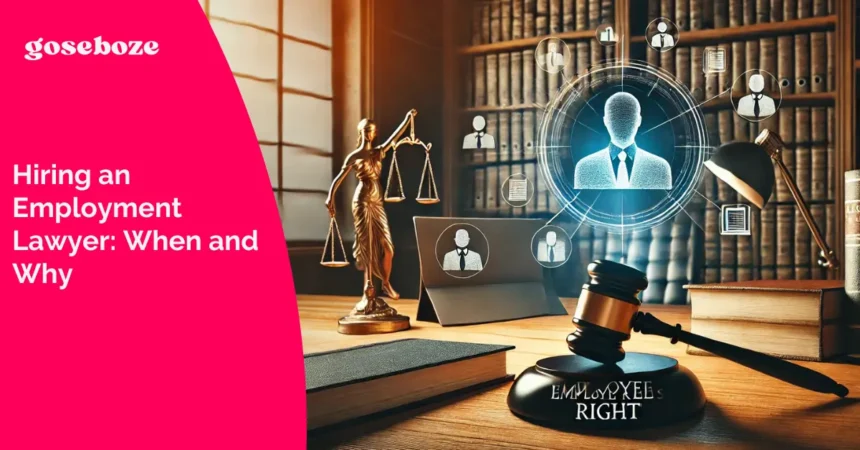Statista estimates that there are 161.43 million workers in the US as of August 2024. This includes workers who worked for pay or profit during the survey reference week, those who worked at least 15 hours in a family-owned business, and those who were absent from work due to adverse weather, illness, industrial dispute, vacation, or other personal reasons.
Miguel Ramirez Law states that many of these employees are unaware of the extent of their legal protections. Sometimes, violations of work rights go unreported. If you are an employee and you think that your employer violated state or federal laws or mistreated you at work, you need legal help as soon as possible.
Here are some scenarios when you might need the help of an employment lawyer:
Signs You Need Legal Help
If you experienced workplace discrimination, harassment, or wrongful termination, you definitely need an employment lawyer. These incidents can be emotionally and legally difficult.
Discrimination based on race, gender, age, disability, religion, or sexual orientation is prohibited, and no one should tolerate verbal or physical harassment. If you suffered from unfair termination, especially due to retaliation or discrimination, you can definitely sue your employer.
Another sign that you may need legal assistance is when your employer violates labor laws, such as failing to pay minimum wage, denying overtime pay, or not providing required breaks.
Your employer has a legal obligation to maintain a safe working environment, so if you’re being forced to work in hazardous conditions without proper safety measures, that’s a red flag too.
If you’ve tried to address concerns internally but were retaliated or mistreated, visit an employment lawyer to understand your rights and choices. Consider that getting legal counsel is a way to protect your rights and well-being, not a way to escalate the situation.
Read Also: How to Craft Engaging Video Thumbnails Quickly
Understanding Employment Law Basics
Employment law covers hiring, compensation, discrimination, harassment, termination, and workplace safety. It regulates how companies must treat employees and governs both sides’ rights and duties. Maintaining a fair and legal workplace requires understanding these principles.
Employees can be fired for any legal cause under at-will employment, and anti-discrimination laws protect them from unjust treatment based on race, gender, age, or handicap. Wage and hour laws, on the other hand, govern minimum wage, overtime, breaks, and meals.
Common Employment Disputes
Dealing with employment disputes can be challenging. As mentioned, the most common conflicts include wrongful termination, harassment, discrimination, wage disputes, and breach of contract.
If you were fired illegally for discrimination or retaliation, you may have grounds to file a wrongful termination case. Harassment involves any unwanted behavior based on race, gender, or religion. Employers who mistreat workers with these protected traits are discriminating.
Unpaid wages, overtime, and misclassification can cause wage disputes. Breach of contract occurs when one party violates an employment contract.
Understanding these common disputes is important for safeguarding your rights in the workplace. If you encounter any of these issues, seeking legal advice from an employment lawyer can provide you with guidance on how to proceed effectively.
Benefits of Hiring an Attorney
To resolve difficult legal issues and defend your work rights, consult an attorney. An employment lawyer can advise and represent you throughout the legal process. By hiring an attorney, you gain access to his knowledge in interpreting employment rules and regulations, protecting your rights.
An attorney can also assess the strength of your claims, grasp the difficulty of your case, and plan the best line of action to win.
When battling your employer or their legal team, an attorney can help. Your lawyer will negotiate, represent you in court, and advocate for you.
This professional support can reduce the stress and complexity of legal processes, providing you peace of mind and a better chance of settling your employment issue.
When to Consult with a Lawyer
If you’re considering filing a lawsuit against your employer or if your employer has initiated legal action against you, consulting with an employment lawyer is important. He can assess the strength of your case, advise you on the legal process, and represent your interests effectively in court.
Consulting with a lawyer in these circumstances can significantly impact the outcome of your case. Hiring an attorney early on can help you avoid stress and uncertainty as well as financial setbacks. When dealing with these issues on your own, you may not get legal advice on how to handle certain situations to avoid conflict.
Conclusion
An employment lawyer can help with workplace issues like discrimination, harassment, wrongful termination, and salary disputes. Understanding your rights and the benefits of hiring an attorney can help you confidently handle employment law and protect yourself.
Do not be afraid to seek legal help to defend your workplace rights.

Morgan Reid, with an MBA and a decade in business strategy, specializes in boosting company performance and operational efficiency. Known for practical insights, Morgan contributes to publications and speaks at industry events, blending expertise with a passion for tech and business innovation.







